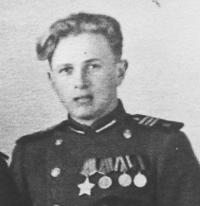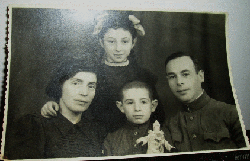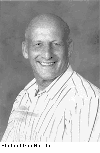|
  I often asked myself: "When did the subject of the Holocaust come up in my life for the first time?" At the age of seven I knew already that we're different: we're Jews. We lived in a small town Zhitomir (Ukraine), where most of Jews had never gone to a synagogue, some of them did not even celebrate High Holidays. I was the luckiest one: my family never had hesitations or doubts about our identity even if some person feels it's really "uncomfortable". My childhood years were filled with memories of the big Jewish families, which overcame Second World War. It's just a part of our life. Children in former Soviet Union know little about Holocaust because we never been taught at school, and FAMILY used to teach first lessons about Jewish identity and Holocaust. Even now RadioFreeEurope published a strange report: "We do not have a special course on that. If you take the school curriculum, specific discussion of the Holocaust is not required. But in our textbooks there is nothing written about the Holocaust." Disturbing reports came out also from some British sources that up to 45% of Britons don't know anything about Auschwitz. My dear readers, I feel, you're ready to ask a question: "Is it possible?" Having opportunity (thanks BBC) I asked this question Chief Rabbi of Russian Federation Adolf Shaevich. Here is his answer: "This is very sad. Someone of smart people said that "... History teaches us many things; we learn very few of them." I often asked myself: "When did the subject of the Holocaust come up in my life for the first time?" At the age of seven I knew already that we're different: we're Jews. We lived in a small town Zhitomir (Ukraine), where most of Jews had never gone to a synagogue, some of them did not even celebrate High Holidays. I was the luckiest one: my family never had hesitations or doubts about our identity even if some person feels it's really "uncomfortable". My childhood years were filled with memories of the big Jewish families, which overcame Second World War. It's just a part of our life. Children in former Soviet Union know little about Holocaust because we never been taught at school, and FAMILY used to teach first lessons about Jewish identity and Holocaust. Even now RadioFreeEurope published a strange report: "We do not have a special course on that. If you take the school curriculum, specific discussion of the Holocaust is not required. But in our textbooks there is nothing written about the Holocaust." Disturbing reports came out also from some British sources that up to 45% of Britons don't know anything about Auschwitz. My dear readers, I feel, you're ready to ask a question: "Is it possible?" Having opportunity (thanks BBC) I asked this question Chief Rabbi of Russian Federation Adolf Shaevich. Here is his answer: "This is very sad. Someone of smart people said that "... History teaches us many things; we learn very few of them."
Growing older I asked more and more questions understanding that Holocaust was unknown experience for me. If school does not teach and most friends don't talk, why do we remember and discuss each detail and moment? Because we are Jews. Definitely, we know ultimate secret of life's purpose: "My life's dream has been realized, I have lived to see Jewish defense in the ghetto rally its greatness and glory. We have to keep alive the remnants that have survived...so there will be some reserve for the future and witnesses to this crime. For us it was a question of organizing a DEFENSE, not an uprising." These were the words of commander Anielewicz shortly before his death, one of the organizers of Uprising at Warsaw Ghetto. Defense, not Uprising, Future, not past, guided Jews through the Holocaust. It's about them Thomas Friedman ("From Beirut to Jerusalem") wrote: "I came to understand a little why the Jews had a state and the Palestinians didn't. The European Jews who built Israel came out of culture of sharp edges and right angles. They were cold, hard men who always understood difference between success and failure, and between words and deeds. They would never settle for a substitute homeland. The Sephardim, the Arab Jews, never could have built Israel. They would have had coffee with Palestinians instead."
Lev Tolstoy said: "Let us forgive each other - only then will we live in peace." It's difficult to imagine forgiving Nazi.
"We are children of Holocaust
We are both German and Jews
We are children of victims
We are children of oppressors
We started out on opposite sides
But the memory of the Holocaust
Will join us Forever.
We shall never let the victims be forgotten
for if we do, we will forget that the
perpetrator can be in all of us." - Rudi Raab
 What can children of Nazi can say to some children of survivors of Holocaust? We cannot even think about them together. All his life Dr. Dan Bar-on dedicated to unique work of understanding of how such trauma as Holocaust can be dealt within families and across generations. He is the One, who start unthinkable experiment, and brought together nine Jews from USA and Israel, whose parents survived the Holocaust, and nine children of Nazi criminals, later they created TRT-group ("To Reflect and Trust" - "to reflect and to entrust"). The children of victims and the children of the oppressors overcame many psychological barriers and began to help others peacefully resolve problems. Do want us to prove that impossible is possible? What do these people feel? What unites survivors of Holocaust and their families in the desire to live? Is LIFE BEAUTIFUL for those who were by "blinded" jerks? Writing this article, I asked these questions Dr. Dan Bar-On. As an answer he sent a couple chapters from his books (you can read - Title). The Journal of Holocaust studies wrote the article about Dr. Dan Bar-On rhetorically asking a question: "What will happen after the survivors die out and there will be no first hand testimonies?" Actually, the right question is: "Will next generation accept the lessons of the Holocaust?" It depends on us. What can children of Nazi can say to some children of survivors of Holocaust? We cannot even think about them together. All his life Dr. Dan Bar-on dedicated to unique work of understanding of how such trauma as Holocaust can be dealt within families and across generations. He is the One, who start unthinkable experiment, and brought together nine Jews from USA and Israel, whose parents survived the Holocaust, and nine children of Nazi criminals, later they created TRT-group ("To Reflect and Trust" - "to reflect and to entrust"). The children of victims and the children of the oppressors overcame many psychological barriers and began to help others peacefully resolve problems. Do want us to prove that impossible is possible? What do these people feel? What unites survivors of Holocaust and their families in the desire to live? Is LIFE BEAUTIFUL for those who were by "blinded" jerks? Writing this article, I asked these questions Dr. Dan Bar-On. As an answer he sent a couple chapters from his books (you can read - Title). The Journal of Holocaust studies wrote the article about Dr. Dan Bar-On rhetorically asking a question: "What will happen after the survivors die out and there will be no first hand testimonies?" Actually, the right question is: "Will next generation accept the lessons of the Holocaust?" It depends on us.
 "We played, we laughed "We played, we laughed
we were loved.
We were ripped from the arms of our
parents and thrown into the fire.
We were nothing more than children.
We had a future.
From the ashes, hear our plea.
This atrocity to mankind can not happen again.
Remember us, for we were the children
whose dreams and lives were stolen away." - Barbara Sonek
7 years ago Sofia Shusterman (currently live in Minneapolis, MN) told me the miraculous survival story of her family during the war. She remembers each details and each moment, in the end she showed me a unique picture of her sister Dora (Dvoira Mroska; dob 1920) :"We don't know anything about her fate since 1939. We saved this picture having hope to find her, but all searches were unsuccessful. Please help us." I filed paperwork with International Division of Red Cross. Unfortunately, this effort was unsuccessful too. It's impossible to describe the pain and sorrow families, who lost loved ones in that difficult time. WE REMEMBER EVERYBODY!
"Son, we live in a world that has walls, and those walls have to be
guarded by men with guns. Who's gonna do it?" - movie "Few good men" I choose these words to begin my story about those, who were in Iraq. Could you imagine Passover celebration "in a place where freedom was ripped apart" and Jewish customs are at least 6000 years old? If you can not, rabbi Mitchell S Ackerson ( Lieutenant Colonel, US Army Reserve, the Senior US army Chaplain of the American in operation "Iraqi Freedom") first organized Passover Seder in Baghdad, even in the presidential palace of Saddam Hussein (Read). I offered a couple questions to Rabbi Mitchell S Ackerson.
 Question: Torah states: "When approaching a town to attack it, first offer them peace." Do Iraqis understand a peaceful mission of American army?
Question: Torah states: "When approaching a town to attack it, first offer them peace." Do Iraqis understand a peaceful mission of American army?
Answer: I think most do
Question: Islam is the religion of freedom and peace. Islam teaches that you live with freedom and you must equally wish and work for the freedom of others. Freedom and equality are interrelated. We cannot practice freedom without practicing equality." How would you comment this statement from Qur'an clear understanding horrible consequences of militant Islam?
Answer: As with so many other things what a faith believes is not always what its adherent's practice. Militant Islam is to me more a statement of politics than of religion or faith.
Question: Judaism recognizes that humans do have the freedom to choose. Many Jews choose to serve country and be in a military. I'm sure, as a rabbi and chaplain, you found various opinions about role of Jews in American army. Do people understand that joining the army is a free choice and Judaism highly favors the freedom of choice? Why did you choose to be a chaplain?
Answer: I think everyone understands that joining the military is a free choice issue. We have many Russian and Eastern European immigrants who have joined the army to say thank you to America and it is a very conscious choice. I joined the chaplaincy while a Rabbinical student and realized that there were many more Jews than people gave credit to and that they wanted and needed Rabbis so I went in and I've stayed for 20 years
Question: "There is no door on the ship the chaplain should not be able to open." How would you comment this quote?
Answer: A Chaplain should have the respect and ear of the entire chain of command. When a Chaplain wants to speak with someone, they should be willing to speak to him or her.
Question: Iraqi Jewish community is one of the oldest in the world. Unfortunately Iraqi Jews left country many years ago. What does Iraqi think about Jews now? Did you personally notice something specific against Jews? Maybe you know, how does former Iraqi Jewish community react on operation "Iraqi freedom?”
Answer: There are still Jews in Iraq just not many. Most younger Iraqis know of Jews only through the propaganda that they were feed for most of their lives and that is the rhetoric that you still hear, they are afraid the Jews want to come back and retake their property, etc. Older Iraqis have fonder memories of Jews and Christians and would not mind if they came back. Most former Iraqis were very happy about Operation Iraqi Freedom
Question: Please describe the most difficult moment in Iraq.
Answer: Being away from home for so long and not knowing when you would ever get home.
There are 24 rabbis in army now, five of them are located directly in front line in Persian Gulf. According to the Geneva convention, the chaplains have no right to carry the weapon even in the front line war. Usually the assistant to a chaplain has a weapon in order to protect him if necessary. I would like to write a couple words about the wife Amy of rabbi Akerson. Knowing how important emotional support for soldiers and officers, she collected money for the telephone cards, that each of them could call home during Holidays.
|
